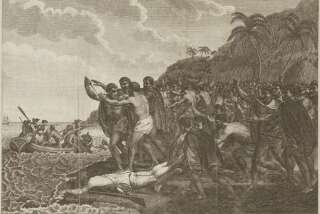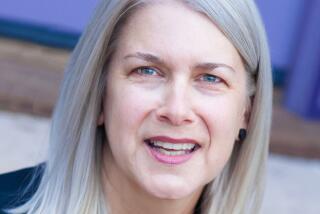Discoveries: In praise of our blue planet
Deep Blue Home
An Intimate Ecology of Our Wild Ocean
Julia Whitty
Houghton Mifflin Harcourt: 256 pp., $24
Julia Whitty has a way of observing nature that is not self-referential. She writes with humor, reverence, true curiosity and an unfettered imagination. She is not afraid to be disoriented or in a state of permanent awe. “Deep Blue Home” begins with a season of field work on Isla Rasa in the Gulf of California. With two biologists, both women, she studied leatherback sea turtles and Heermann’s gulls. In spite of their isolation, “our generation of scientists,” she writes, is “shaped by the inescapable responsibility of studying wild animals in wild settings forever diminished by our kind.” In the absence of men, the three “abandon grooming routines.” Whitty’s thinking about her fieldwork in Baja is informed by various readings from Hindu and Buddhist texts. In Sanskrit, she writes, “rasa refers to a cosmic dance performed by the dairymaids …around the still center of Krishna.” In the Upanishads, “rasa” refers to “the essence or flavor of something with great emotional effect, something existing beyond the senses.” Whitty’s work also takes her to Newfoundland, where she observes migratory birds and humpback whales. She thinks about the Vikings and the Inuit. The word “rasa” follows her there, with new meanings — from the Rig Veda, it refers to the name of a “mythical river flowing around the world, uniting the land, the sea, and the air.” To the ancient Greeks, the word means “a uniting, circulating life force.” Whitty travels with words, refining her ideas, observing the natural world — “the carefree life of a sea tramp …in migration much of the time with only a few dollars in my pocket and only a vague notion of how I’ll get home again.”
Saved by the Sea
A Love Story With Fish
David Helvarg
Thomas Dunne/St. Martin’s: 304 pp., $25.99
There’s something special about writers who think deeply over decades about the ocean. In their memoirs, they seem to have globe-trotting lives, unhampered by ordinary boundaries and borders. Like Whitty, David Helvarg writes about how his life’s course has been fashioned by the sea. Inspired as a child by Jacques Cousteau (like so many children!) and Rachel Carson, Helvarg began as an investigative journalist. In his 30s he discovered diving, which deepened his interest in the sea. He became an ocean activist and an environmental journalist. “Saved by the Sea” tells the story of Helvarg’s increasingly refined focus on issues that threaten the sea. Along the way, Helvarg meets, loves and loses his great love, his partner Nancy, to breast cancer. He describes how the ocean saved him and kept him going. Helvarg is not especially hopeful about our ability to prevent species loss and habitat destruction around the globe. “I don’t really expect a revolution in either politics or consciousness to radically alter the cascading ecological collapse of our ocean planet. I do, however, note a rising line of ecological mindfulness approaching the declining plane of biological diversity on our water world. Where that X crosses will tell us how much is left to save and restore if we can.”
Salter Reynolds is a writer in Los Angeles.
More to Read
The biggest entertainment stories
Get our big stories about Hollywood, film, television, music, arts, culture and more right in your inbox as soon as they publish.
You may occasionally receive promotional content from the Los Angeles Times.






